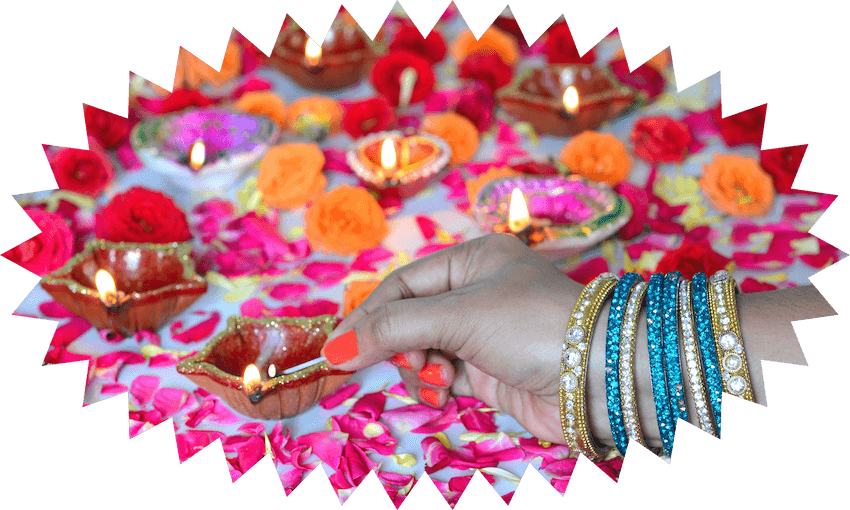The two most important ingredients? Light and food.
Even though I’m not Hindu, I’ve been celebrating Diwali since I was a child.
I love that it’s a celebration of light over darkness. Thousands of years ago, it was on Diwali that Lord Rama with his wife Sita returned to Ayodhya (the birthplace of many gods and goddesses) after killing the demon God Ravana and being in exile for 14 years. To symbolise the victory of good over evil, the entire kingdom was lit with clay lamps – diyas – and firecrackers lit the sky.
Now whether you celebrate Diwali with diyas, fireworks or a $2 battery-operated tealight is up to you. I tend to celebrate it the way my youngest eats his dinner. I gobble up the tastiest, easiest bits, drop a lot on the floor so it looks like I made an effort and leave the crusty hard bits for Mum to finish.
Fairy lights instead of diyas? It works. Store-bought savoury snacks instead of spending hours making them at home? Check. Chalk-drawn rangoli rather than intricate multi-coloured patterns? That counts too.
Because in my book, traditions are not about following a recipe to perfection. Traditions are a way for us to assert our identity. And just like our identity evolves with our beliefs and the season of our lives, traditions have permission to evolve.
This year Diwali is on November 12, though the festivities run from the 10th until the 14th. If you’re keen to get amongst it with minimal effort, here are five easy steps.
Bribe or boss family members into cleaning the house
Before the festivities can begin, a good Marie Kondo-style spring cleaning is essential to kill the negativity and welcome the positive vibes.
Growing up, Mum and Granny would “clean” the house or rather supervise our domestic help who did the actual cleaning. I was enlisted to climb the six-foot wooden ladder and sweep the ceiling fan clean.
I’ve tried similar bossing around of my kiddos. Bribing too. But neither has worked. My approach this year – hire a cleaner.
Buy silver, gold or steel for Dhanteras
Dhanteras marks the beginning of Diwali and if you were waiting for a sign to buy jewellery or a shiny new gadget, this is it!
The mythological story goes that Yama (God of Death) appeared in the form of a serpent to bite King Hima’s son. But, he was blinded by the gleam of all the gold, silver and brass his wife had laid out and could not enter the room that saved his life.
To ensure a long life for you and the family, you therefore go shopping for shiny silver, gold or, at the very least, some steel for the kitchen.
Skip the adult colouring and give rangoli a try
While rangoli – colourful chalk patterns – is synonymous with Diwali, the tradition comes from women stuck at home using everyday items like lime chalk, flour and dried grains to both express their creativity and keep ants away from the house. It’s also neighbour code that you’re throwing a party and might steal their off-street parking.
You can make a rangoli with chalk using dot patterns or flowers from the garden. You can also follow my lead and simply laminate a mandala you coloured in. Indulging in Rangoli gives me something fun and messy to do with the kids and reminds me to be more present. Think of it as giant adult colouring.
Give the gift of food
Rather than cheap K-mart crap you don’t really need, the emphasis at Diwali is on food gifts. Think boxes of Indian mithai, gift hampers of savoury Indian snacks or even boxes of mixed dry fruits. Growing up, Mum used Diwali as a chance to get together with her mates and learn new Indian desserts.
During lockdown, I went the “mom living on a homestead” route. My kids and I made jam using the frozen strawberries we had picked last summer, ribboned together fresh herb bouquets from our backyard and left our parcels on the postbox for neighbours to collect. Guess who won some free babysitting brownie points?
Eat together, preferably a biryani
This is when you give thanks for the good stuff for about 47 seconds before indulging in delicious food. Food is something that unites us all and my favourite thing to cook at Diwali – or any party really – is biryani. Imagine a heady melody of slow-cooked protein, aromatic whole spices like cardamom, cloves and cinnamon and long grains of rice bringing everything together. There’s also no joy that beats digging around a big pot of biryani for that perfectly succulent piece of lamb before someone else steals it.
The list of ingredients for a biryani can feel overwhelming. This is why I urge you to use shortcuts like ordering a Diwali special biryani meal kit I’ve put together with My Food Bag or buying a family pack from your local Indian restaurant – my favourite is the one from Bawarchi on Sandringham Road in Auckland.
If any of the steps above feel hard, remember that the only requirement for “celebrating Diwali” is food and a single burning lamp. No intricate food experiments for us this year – we’re sticking to a carrot halwa – but the kids are old enough to paint diyas so we’re having fun with that instead.



